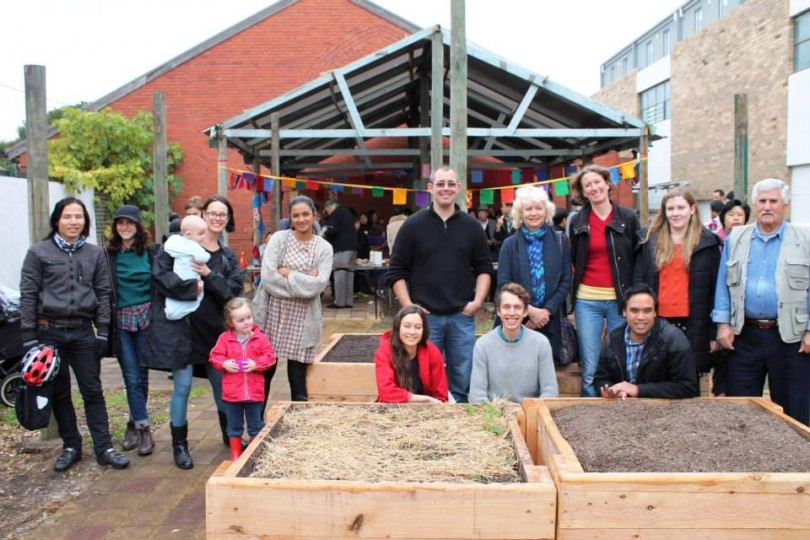Planning when, where and what your next meal will be is a taxing task for many people. But for some, making a decision about food is not a luxury, it’s a matter of survival.
Once never talked about, food insecurity is now acknowledged as impacting on some of the most vulnerable members of our society. Health groups now work with local governments to introduce community projects and policy to provide residents with a higher quality, more sustainable lifestyle.
Disadvantaged groups are most at risk of being unable to meet the Food and Agriculture Organisation for the United Nations pillars of food security: availability, access and utilisation.
A staggering 1.2 million Australians recorded running out of food at least once in a 12 month period, according to the National Nutrition Survey by the Australian Bureau of Statistics in 1998.
Cultivating Community is a volunteer-run initiative which focuses on strengthening education and access to fresh produce. They have developed and supported 21 public housing and two non-public housing community gardens.
Each project offers community members the ability to plant and maintain produce within the garden beds. Over 800 public housing tenants have access to plots, Cultivating Community Garden Team Leader, Sharelle Polack said.
The two non-public housing projects were developed in Northcote and Footscray. Caretaker of Sunnyfields Community Garden project, Pastor Cameron Healey said the demand for plots is growing in popularity among Northcote, Preston and Thornbury residents, as well as local business owners.
Sunnyfields garden provides its 20 members with low cost and easily accessible area to grow fresh produce in a chemical free environment. Each of these aspects are pivotal to meeting food security requirements. Seminars are run by Cultivating Community to help educate members on best practice techniques for gardening and compost.
“As the years go by people are more and more interested in sustainable living and growing their own produce as there is a lot of skepticism about where or how things are stored in the larger chains,” Pastor Healey said.
Community is Pastor Healey and the Northcote Baptist Church key focus. The plots give people the opportunity to connect with like-minded individuals they may not have had the opportunity to interact with otherwise.
“It is amazing to see the age difference, we have gardeners from late 20’s all the way up to 65 and because they all have an interest in gardening and organic produce, they do life together,” Pastor Healey said.
Sunnyfields has run out of plot space but this didn’t prevent a local café manager from broadening his gardening area. The man provided an old bathtub so he could continue expanding his vegetation area. Plans are currently underway to extend the area so more locals can get involved.
St John’s Parish in Footscray is home to the Footscray FOODpath project. The vegetation patch is a collaboration between Cultivating Community, Victoria University, Foodbank Victoria, City Making Collective and the African Australian Community Centre (AACC).
The aim of the project is to provide fresh produce to members of the AACC and its neighbours. Cultivating Community work closely with St John’s Parish Chaplin to maintain the area.
To create systematic change, nine local governments worked with the world’s first health promotion foundation, VicHealth to implement strategies to boost education, supply, infrastructure and access.
The Food For All initiative ran for five years, introducing eight programs into local government areas. Principal Program Officer, Sonya Stanley said the aim of the projects were to increase regular access to, and consumption of a variety of foods particularly fruit and vegetables by people living in communities experiencing higher rates of disadvantage.
Educating councils about the prevalence of food insecurity within their municipals, as well as establishing the need for strong and precise policy to be developed, so members most at risk had legislation in place which was directly aimed at protecting their vulnerability.
Most residents involved in the programs were lacking fundamental knowledge about the balance needed for a healthy lifestyle. Knowledge about fresh produce was a major contributor to the difficulties faced by the community members involved in the VicHealth programs. Seminars were developed in response to the utilization category with the hope of improving food awareness, and develop skills to adhere to best practice.
“The project evaluation provides evidence that healthy eating and food supply strategies increased awareness, knowledge, food skills and intention to implement new knowledge in relation to food security,” Ms Stanley said.
Sustainable living is becoming a common phrase in Victorian households. From small community groups to restaurant owners, awareness is rife among the public, with everyone looking for creative ways to live healthier and aide food insecurity, whilst making the most of their inner-city apartment living.
Vichealth continues to fund projects aimed at exploring innovative ways to improve supply and access to fruit and vegetables, as well as promote a culture of healthy eating in Victoria.











